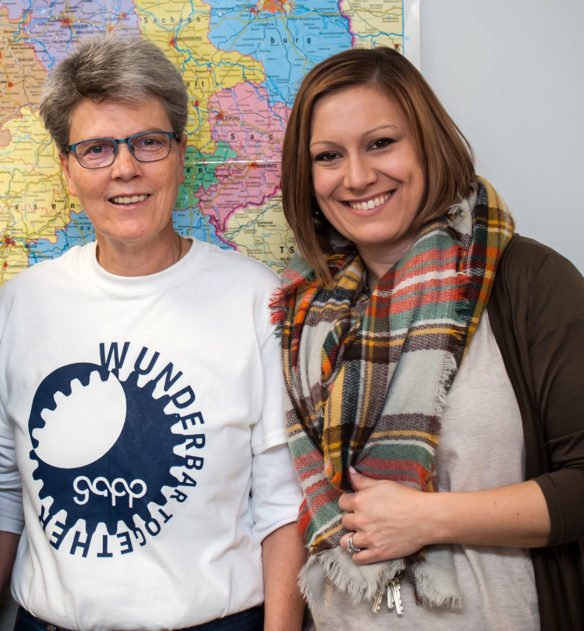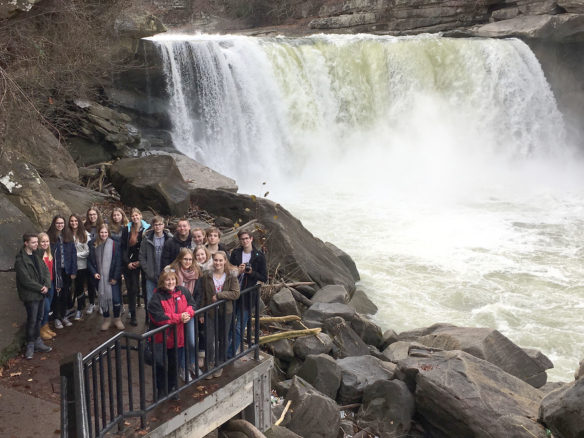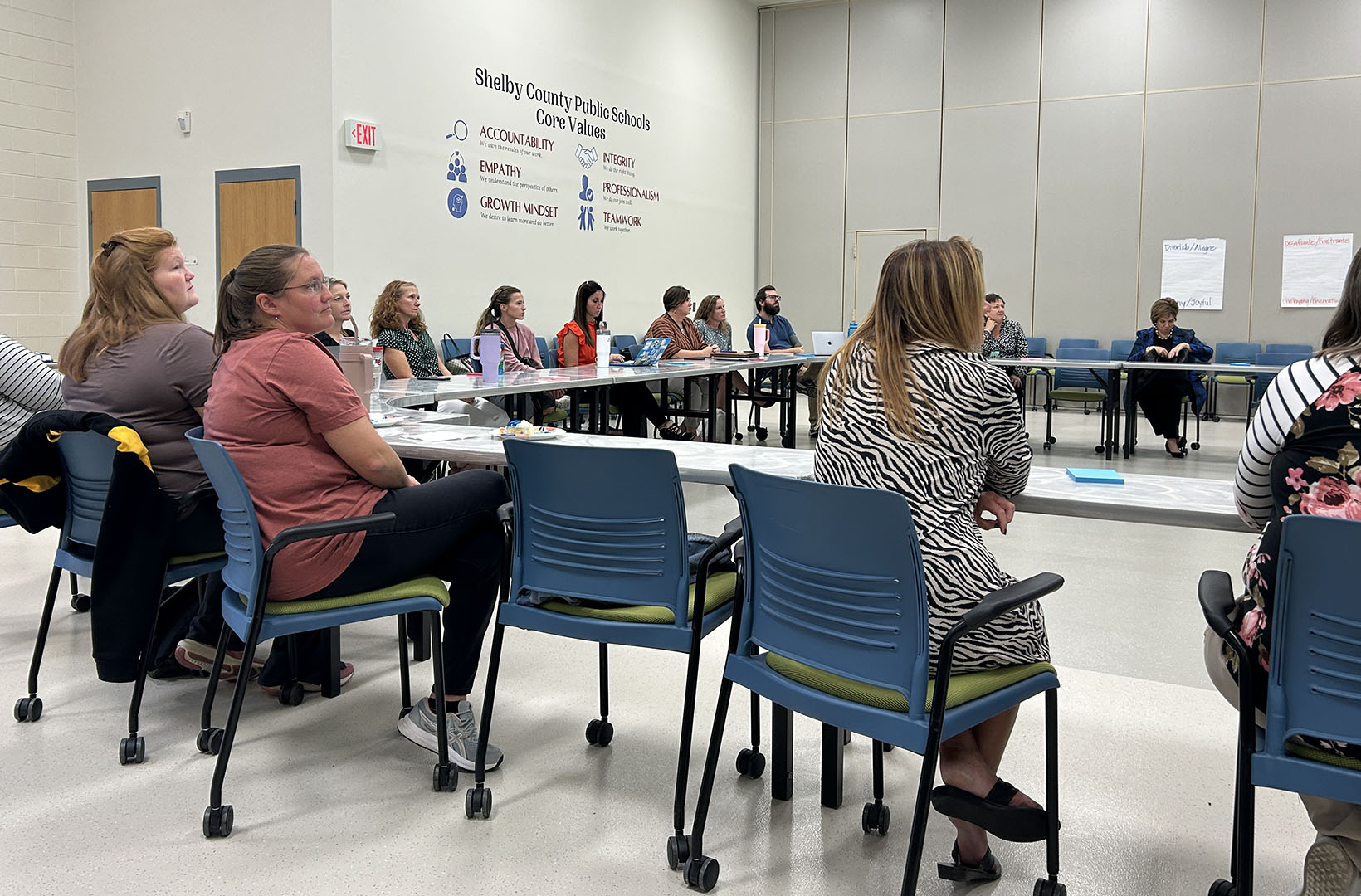Global teachers create global students. Traveling the world with your students may sound like a huge step to take, but in fact, it is manageable for every teacher willing to give it a try.
In the case of three high schools in Warren County (Greenwood, South Warren, and Warren Central), what began 10 years ago with tons of e-mails has developed into a sustainable partnership between our schools and Anne Frank High School in Werne, Germany. Below, you will discover how you also can create a thriving international exchange and the benefits of this type of work for your students, your district, and yes, even you, the teacher who organizes it all.
The Process of Creating a Partnership
Honestly, there’s more than one way to create a great partnership; however, we’re outlining how it worked for us and a few ideas you might be able to use to find your future partner school. Our program started with one exchange student at Warren Central High. Her teachers in the U.S. and Germany were inspired to begin an exchange program and got in touch with each other through that student. Your program can begin as simply as that: through one exchange student.

Heike Armbrust, left, an English teacher and German educator at the Anne-Frank-Gymnasium in Werne, Germany, and Nicole Whitescarver, a German teacher at Greenwood High School (Warren County), team teach in Whitescarver’s classroom.
Submitted photo by Karen Phillips Littlewood
The most important question for anyone beginning an exchange is “How can we find a partner school that is a good match?” It is necessary to think through what exactly you are looking for in an exchange partner. Select a school whose students have similar interests, education levels and curricula, especially if you’d like to do joint projects with your partner school. Lastly, you want to be sure both your school and your partner school are committed to sustaining the partnership so that you have time to see the results of your great work.
Once you have a clear picture of what your long-term goals are, you can start your partner school search. There are several online platforms and organizations that can help you with this search and even support you later; however, there are also several inauthentic organizations out there, so be thorough in your research. An alternative way to find a school, that in times of the Internet and school websites is fairly promising, is to contact the schools you are interested in directly, as we did through the exchange student’s contacts. The advantage of this approach is that you immediately identify your co-sponsor and can start placing the cornerstones for your school partnership right away instead of waiting for an organization to put you in touch with each other.
While the above-mentioned exchange student was in the U.S. for a year, the exchange program that grew out of that experience is only 16 days long. When you develop an exchange program, decide what works for your students and your school calendar. We decided to join a program called the German-American Partnership Program (GAPP), sponsored by the Goethe Institut, and their requirements were that the exchange was at least 16 days long.
Finding a support system like GAPP is helpful, but if your exchange is with a country other than Germany, know that joining an organization is not an absolute for partnerships to be successful. You don’t even have to offer the German language to join GAPP.
Once you have established a partner school and a partner teacher, we found it helpful to begin by hosting a small number of visitors. Perhaps for the first few years you simply host students from another country as a way to help everyone get used to the idea, or perhaps you will decide to jump right in and take your students to stay with the student they hosted that same year. Either way, be sure all the proper channels of approval have been followed. This process will help your program endure.
Reasons to Develop or Strengthen an Exchange Program
- Partnership inside the classroom
A school partnership can easily be started inside any classroom. Your partnership can start as a simple email exchange or through a Flipgrid partnership. Teachers can set up an interschool language exchange or start a collaborative science, history, art or music project with a partner school even without an exchange program. Connecting via communication tools like Skype could be a great tool for class-to-class video conferences.
Working together in different academic fields is a good way to develop a strong foundation for possible future exchange travels. Sometimes these international activities can organically lead to an exchange, but even if they don’t, students can still benefit in many ways from this international experience.
For exchanges, it certainly is important to implement classroom activities that include your partnership. Not only does it help create strong bonds between the students, it also shows other teachers and your administration what the exchange can do. Furthermore, it will make the intercultural learning and teaching that should come from an exchange more successful.
- Student and family experience
In the past 10 years, our exchange has involved more than 400 students and families who host students from our exchange partner school and visit our exchange school and stay with the student they hosted. This means our students have a full immersion experience into our exchange partner’s country, language and culture. Many of these students have established close and long-lasting friendships during their stay abroad. Of course, an exchange program will help students develop a deep understanding of the life, history, politics and cultural diversity of another country.
- Authentic professional development
For teachers, school partnerships give them the opportunity to grow professionally and teach best practices with an international audience. Teachers who speak another language have the opportunity to hone their skills, learn new expressions and dialects, and get to share their love of the culture with students. Teachers who help with the exchange who may not speak the language can grow through the classroom experiences in another country. They gain experience with teachers in other countries working within their different education systems.
Another area of professional growth is learning how to communicate with your exchange partner in regular, clear and open-minded ways. Your exchange program can only be as strong as your communication with your co-sponsor. Within our exchange, collaboration made us grow as teachers and as people. We had to learn about each other’s culture and educational system to make things work. We had to become true global teachers to help our school partnership blossom.

A German high school exchange group enjoys the Cumberland Falls during a visit to Kentucky. Nicole Whitescarver, a German teacher at Greenwood High School (Warren County), said student exchange groups don’t need to be taken to national landmarks in the U.S. to enjoy themselves and gain a deeper understanding about what it means to be a teenager in America.
Submitted photo by Heike Armbrust
Looking back on 10 years of experience, we cannot encourage teachers enough to establish a school partnership with the eventual goal of running annual exchange trips. Language barriers do not play a big part since English is spoken all over the world, and after all, the real world language is understanding and kindness. Educators can help their students speak it by teaching them abroad!
When we organized our first exchange trip, we were confronted with quite a few naysayers and we certainly made mistakes, but we learned from them and managed to improve the trip each year. Teachers, trust your own abilities and lead your exchange partners through the beauty of your own country. It is amazing how fascinated students will be by little things they discover, by small places they visit and by regional specialties they see abroad.
The annual exchange trips we take to Bowling Green, Ky., and Werne, Germany, are fairly easy to run at this point. Possible difficulties are not as threatening and the students’ excitement and appreciation offer amazing compensation for our hard work and commitment every single year.
One last note for all of you considering starting an exchange: You must not think you have to show your exchange partners the most famous landmarks of the U.S. It is important to proudly present the true life in your region to make your partners see that American teenage life is not “High School Musical.”
We found that letting our high school exchange students fully immerse into the real life of our hometowns made them love their partners’ country more than they ever had imagined. We all left the path of tourism and started to walk the path of global citizenship.
Collaborating with schools in other countries can not only put lessons and world events into context, but it also has a significant positive effect on the global awareness and attitude of high school students. Within our own GAPP activities, we have noticed how much citizen diplomacy has been created. Kentucky teachers can support this valuable development in our schools, homes and hearts.
Heike Armbrust is an English teacher and German educator at the Anne-Frank-Gymnasium in Werne, Germany. Additionally, she runs annual student exchanges with three high schools in Bowling Green with support of the German American Partnership Program (GAPP). Since 2012, she has been working as the facilitator of International Student Teacher Placement in collaboration with Western Kentucky University.
Nicole Whitescarver is a German teacher at Greenwood High School (Warren County). She runs the exchange alongside Todd Steward at Warren Central and Dallisa Haas of South Warren High School.




Leave A Comment